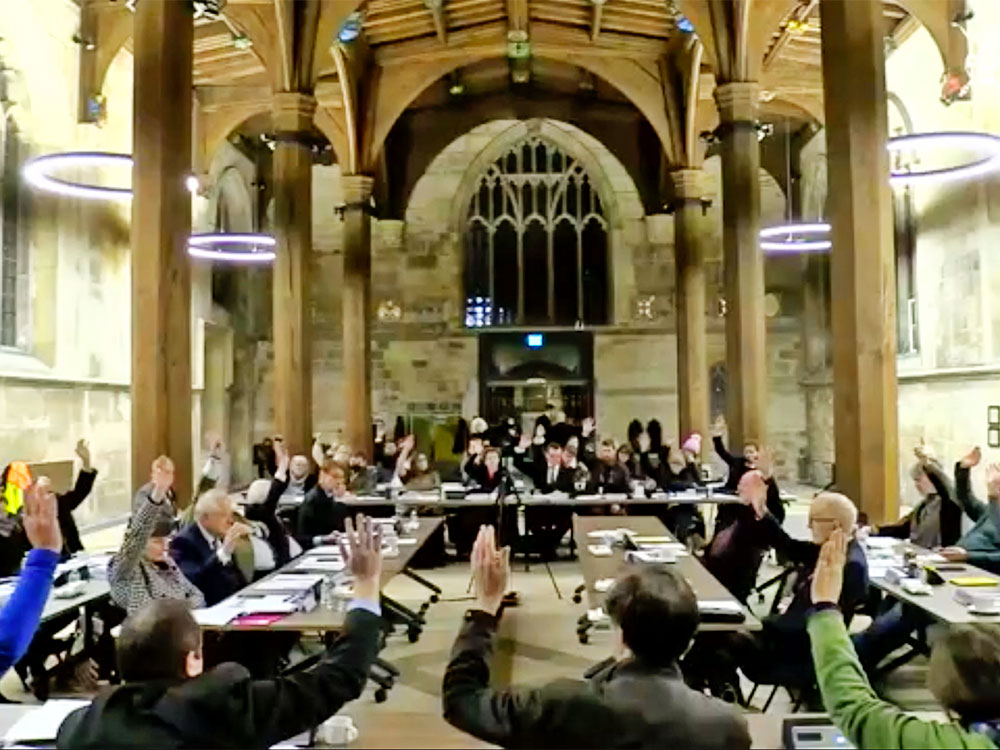York councillors voted overwhelmingly to award themselves a pay rise of just over four per cent as they explained they were “not immune” to the cost of living crisis.
Disagreement behind the scenes in recent weeks prompted a debate and vote on the issue at a meeting of full council at the Guildhall on Thursday.
Conservative group leader Cllr Paul Doughty and independent Cllr Mark Warters voted for no change to their allowances.
Cllr Doughty said it was wrong to increase pay when senior council figures are talking about the huge financial pressures facing residents and the council itself.
He added: “Perhaps some need reminding that being a councillor is not a job, you are free to have careers and that a large part of being one is because you want to do some good for your local community – not fleece them at any given opportunity.”
Councillors voted to increase both their basic allowances and the special responsibility allowances some receive by 4.04 per cent – the amount backed by the council’s independent remuneration panel (IRP).
Inflation, as measured by the consumer price index, stood at 10.7 per cent in November.
A councillor’s basic allowance now stands at £11,282 – an increase of £438. The total cost to the council of this year’s increases is £32,641.
When the 4.04 per cent increase was first floated by council officers last month, the Labour and Green group leaders asked officers to explore the impact of a higher increase – though both groups voted for the lower option on the night.
An increase of £673 was also on the table at Thursday’s full council.
‘The right balance’
Labour leader Cllr Claire Douglas said 4.04 per cent struck the right balance between an amount which would attract a diverse mix of people to becoming councillors, while also acknowledging there is a cost of living crisis.
“We shouldn’t imply through our stance on councillor allowances that we are all financially comfortable individuals or that we are not worth the allowances paid to us,” she added.
“We will all be worse off this year than last year and this figure falls well below inflation and lower income councillors will continue to struggle.”
Independent Cllr Dave Taylor, who will not be standing for the council in 2023, said he favoured the higher amount, but backed the IRP recommendation.
“I firmly believe that the council needs to attract people of all ages and of all strata of society, not just the most well off and those that are retired,” he added.
Lib Dem Cllr Andy Hollyer said: “We cannot pretend, as the Conservatives would have it, that councillors are immune to inflation, or that further real terms cuts won’t impact our ability to serve our communities, or who can afford to be a councillor.
“Council officers were making arrangements to apply option one (4.04 per cent) as the assumed fair rate, however due to the Labour group seeking option two and the higher seven per cent rate, we’re unfortunately in the position we’re in tonight – although I do recognise Labour have now changed their position.”
In 2020 and 2021, councillors allowances rose in line with other local government employees, as per the council’s constitution. It was the fact that local government employees’ rises were calculated differently this year which prompted a debate about the councillor increase.
The last time allowances were reported on by the IRP, in 2019, councillors voted to hike the basic allowance by 12 per cent and SRAs rose by up to 50 per cent.
[tptn_list limit=3 daily=1 hour_range=1]
